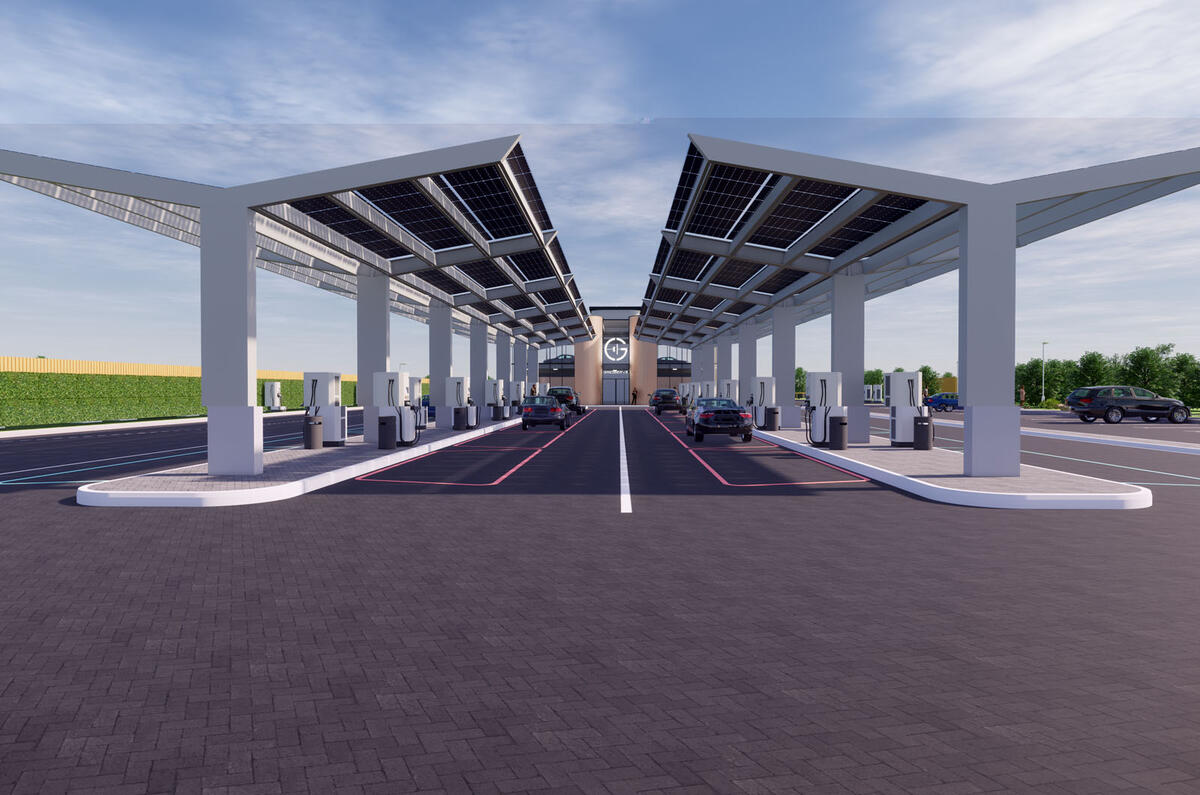Japanese technology giant Hitachi has invested several million pounds into British electric vehicle charging firm Gridserve as part of a move to speed up the mass adoption of EVs in the UK.
The ongoing investment, which so far stands at £5.6 million, will support the development of Gridserve's nationwide network of dedicated charging stations, with the first of its planned 100 sites set to open this summer. The two firms are also collaborating on plans for an electric bus network and financial incentives for EV buyers.
The first site to be built as part of the Gridserve's £1 billion scheme, near Braintree in Essex, will offer space for 24 vehicles to charge simultaneously at a rate of up to 350kW from its supercharger devices.
The company claims that customers will be able to charge within 20-30 minutes at first, but that waiting times will reduce as battery technology evolves. Currently, the only vehicle on sale that can charge at 350kW is the Porsche Taycan, with the Tesla Model 3’s 250kW compatability making it the second fastest.
Gridserve’s charging stations will be powered by a combination of roof-mounted solar panels, separate solar farms and integrated battery storage units, which, it claims, will ensure “carbon emission targets can be met, whilst also keeping prices low”.
Like a conventional motorway service station, the 2.5-acre Braintree facility, just off the A131, will contain a small supermarket, coffee shop and lounge area with wi-fi and meeting rooms.







Join the debate
Peter Cavellini
Let’s see.
I do hope they are build as quick they hope.
The Apprentice
While the infrastructure is
While the infrastructure is woeful there is money to be had making 'premium' charging stations as many EV's are premium too the drivers will be evaluated as being able to pay the prices. But it aint going to be cheap here, from the coffee to the kWh's
xxxx
Of use but electricity infrastructure is in place for now
Infrastructure is in place for 90% of people 90% of the time already what with houses having there electricity supply at around 30% of the price, would you pay £3.30 a litre for petrol? Yes there's a growing need for these places but demand won't be a problem due to improvements in tech and BEV's slow growth
Basically ask a current LEAF or Zoe owner what percentage of their power comes from a commercial road-side supplier.
Citytiger
xxxx wrote:
What total bollocks you spout, 90% of the population do not have a facility to charge an EV at home or at work, and to claim they do is a lie, unless of course you can prove otherwise. Vast swathes of inner city dwellers dont have access to off street or designated parking spaces, what about the thousands of resident living in tower blocks or multi occupancy appartment complexes?
si73
And all the modern style
Peter Cavellini
Motobility.
Motobility are the second biggest fleet of cars on the Planet (US Army is first) and yet they don't offer much choice in EV cars.
jagdavey
The only way is Essex.........
Great for Braintree, great for Essex..............we will need many more of this facilities before 2035!
LP in Brighton
Why bother with battery storage?
Why bother with the integrated battery storage units? I realise that this makes the whole facility independent, but the cost of the batteries and losses associated with charging / discharging must undermine efficiency. I would have thought it cheaper and greener to sell off excess power to the grid during daytime, and import it back again during nightime (and most days during winter).
Or maybe that's happening anyway, but they have chosen not to mention it?
Magnitio
Why bother with battery storage?
The potential to charge 24 cars at 350KW would put a serious load on the grid. Using battery storage helps to smooth the demand and also provide energy back to the grid if required. In addition, the batteries can be fully charged overnight with cheaper electricity. As the market moves more to the use of renewables for generation of electricity (e.g. wind/wave/solar) there will need to be greater use of energy storage to support the grid during periods of higher demand or lower generation e.g. dull, windless days.
Cenuijmu
I think this is a dead duck
When supermarkets get on the bandwagon and give free charge if you spend £60 or more....
Pages
Add your comment